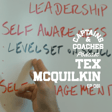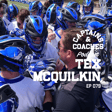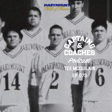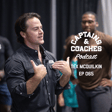Become a Creator today!Start creating today - Share your story with the world!
Start for free
00:00:00
00:00:01

008 - Anti-Hero Leadership w/ Brett Bartholomew
What can Willem Dafoe and Shamu teach you about leadership? Winning isn't for everyone.
Brett Bartholomew, author of Conscious Coaching and Founder of Art of Coaching joins C&C to peel back the psychology of self-motivation, revealing what truly drives athletes and keeps you connected to your goals.
Training Programs - 7 Day Free Trial
Old Bull: https://bit.ly/old-bull-train
Captain's Speed, Strength, & Swagger: https://bit.ly/captains-train
#CaptainsAndCoaches #ConsciousCoaching #Motivation #Leadership #CoachingPsychology #FeedbackMastery #ArtOfCoaching #AntiHeroLeadership #BrettBartholomew
Transcript
Introduction and Motivation Psychology
00:00:00
Speaker
Welcome to another episode of the Captains and Coaches Podcast. I am your host Tex McQuilken and today I traveled out to Phoenix, Arizona to sit down with Brett Bartholomew, the author of Conscious Coaching and founder of artofcoaching dot.com. In this episode, we talk about motivation psychology, how a coach can communicate in the dreaded film room and how an athlete can take that criticism slash feedback.
Athletes and the Anti-Hero Persona
00:00:27
Speaker
And then we get into the anti-hero, what it means to take on that persona of villain as an athlete and how that can lead to success.
00:00:36
Speaker
awesome conversation and sit down with Brett. This episode is brought to you by Art of Coaching. Head to artofcoaching dot.com and check out all the live events. I've had the fortunate opportunity to attend the apprenticeship and the speaker school.
Leadership and Management through Coaching
00:00:50
Speaker
The apprenticeship is one of the most valuable experiences that I've had as a leader. If you are looking to improve your social agility,
00:00:59
Speaker
your ability to connect and manage people as well as understand the power dynamics and where you rank in your business or within your team, this is for you. You are put in situations to think on your feet and then come up with strategies to come out alive so when you go to the real world you are prepared to manage those expectations, experiences, and steer the conversation. Miscommunications can be costly. The apprenticeship is there to empower your communication, social agility, and ability to think on your feet. Head to artofcoaching dot.com, check out all the live events, and then get 10% off with the code TEX10, T-E-X, and the number 10,
00:01:49
Speaker
That's going to get you 10% off of live events.
Brett Bartholomew's Entrepreneurial Journey
00:01:52
Speaker
Highly recommend the apprenticeship. There's a couple already on the board for 2025. Without further ado, let's get into some fun social agility, talk about anti heroes and all this fun stuff with Brett Bartholomew. Ready? Ready? And
00:02:19
Speaker
Hi. Okay. Action. Welcome to another episode of the captains and coaches podcast. We are live on the scene in Arizona at the headquarters of the art of coaching. I'm captain. He's coach. Welcome to captains and coaches. Yes. I have a special guest, Brett Bartholomew. Welcome to the show. Glad to be here in my office sweating with you.
00:02:42
Speaker
I know. It's 117. We're in record heat in Arizona. Indian summer, bud. I don't know what that means. Prolonged summer. Past the time when it should be summer, but it's still summer. Getting ready to run the retreat so it knew to be 110 degrees. 50 degrees Celsius roundabout for those of you in the international community. And and what are we doing here this weekend?
00:03:02
Speaker
What we're doing, Tex, is when I went out on my own as an entrepreneur, there was nothing but kind of douchebag masterminds. You either had to like want a 10X business, have a private jet and a platinum blonde wife and want to shoot guns all day and backflip off of caves in Belize, or you had to have some business where you were in one area, like a gym owner or a real estate agent doing like a million dollars a year. And at the time I was like, where's just simple, no-nonsense,
00:03:28
Speaker
things that entrepreneurs, whether they're trying to make their first buck or first million, can kind of get together and share ideas. Like, hey, I got a course I want to release, or I'm thinking about building a compound on my, you know, my property, or hey, I could just use some guidance with marketing.
00:03:42
Speaker
So we started a program called The Coalition, which is a non-dushi mastermind, at least we try to make it such.
Retreat Activities and Team Building
00:03:48
Speaker
And within that four to six month window when we run it, which is usually twice a year, we pay for a whole retreat. So we get hardworking, overthinking, hard on themselves people to come together, have some fun,
00:04:03
Speaker
have some heads down time and some recreation. So we're going to go do a wipeout style obstacle course on Lake Pleasant. We're going to cook a lot of food. We're going to throw mini footballs. So we all feel like really good athletes. We're going to jump in pools and we're going to do some campfires.
00:04:18
Speaker
but Great time. Team building. Team building. And hopefully you teach me about hair because mine is atrocious and yours is wavy as always. All will end the show with my routine. yeah Products. Roisal. Yes. yeah So many people have been sliding to my DMs asking about my skin and hair routine. It's the side time for me. Okay.
Effective Feedback and Athlete Communication
00:04:37
Speaker
the We're going to be discussing a lot of feedback and something you create, you work hard this weekend, and then you're going to be wrestling them to make sure they get a good look at it. There's parallels to this and how a coach would lead a team. Yeah. And that's that's what I want to take the opportunity to discuss with you. New coaches to this or coaches that have been leading teams at any level, they got to deliver bad news. Yep.
00:05:04
Speaker
So that's what I want to circle around is not only the perspective of a coach delivering feedback. So how an athlete, how they deliver feedback to an athlete and then how we'll go into a little captain's corner, speaking to the 14 to 18 to 22 year old, how they should be receiving that feedback, yeah not as attack, how they can redirect that into performance and development. yeah So that that's the circle of this conversation. And I feel it's appropriate to lead with the coach.
00:05:34
Speaker
and where they they don't get defensive, right, or they don't feel they lose the kid. So that that's where I want to start is is feedback delivering from the coach. And you are the coach of coaches the art of coaching here. So imagine now I'll set a scenario a scene for us to discuss.
00:05:52
Speaker
and we've all been there and i'm I'm sweating just thinking about it or it could be the lights, film room, post game. We got to show up on Saturdays following a tough loss and we got to watch the film. Yeah. So this, this ties is very close to what my master's degree was on was motor learning. And so we would talk about augmented feedback, especially amidst constraints and knowledge of performance and knowledge of results.
00:06:19
Speaker
right knowledge of like performance being like, all right, we're giving feedback in the moment. And I know we're doing the film room thing, but just contextualizing this in a moment. So if somebody's doing a clean or they're performing a drill, whatever that is, giving that feedback immediately. right So then that get that's knowledge of performance. Here's how this was. Here's what we can do. Knowledge of results is post-session. OK, I've watched the whole thing now. I've kind of been quiet. I'm simplifying this for the context. um But now let's a look at overall how we did.
00:06:47
Speaker
And we can do that in general, like you came out for our facilitator course, you get knowledge of performance, right? So intermediate feedback, hey, try this, or you did that, or excellent job here. And then overall assessment, right, that knowledge of the results. And so ah film room.
00:07:04
Speaker
I remember when I worked at Southern Illinois having to do that right after a game, you know, the next day we'd be in there and offense would lift, defense would run, flip-flop, and then you're in there watching film. And yeah, that can always be very interesting because you're going to have athletes. People, again, forget that out everybody These people are individuals first, you're people first. So there are people to your point that are going to take it as a critique because it's what they care about. And the closer you are to something, the more personal it feels. and You see that with coaches too. There's somebody listening right now that if somebody taught them a new drill, whether it was in the weight room or the sporting context, I'm all ears. Feed me. Tool in the toolbox. But if you go tell them about their tone of voice or something about interpersonal communication, that's an attack.
00:07:49
Speaker
You know, they feel like that's not the same thing as giving me a new drill or new insight into this and that. So um yeah, what do you want to tackle specifically on the film room? And then we'll go from there. I feel we should start with tact. but They know they made the mistake. Yeah. So if we're, if we're focusing on the knowledge of results, the kid knows what's coming. That, that play happened in the third quarter. yep How are we going to approach this? The old ball coach way.
00:08:13
Speaker
or is there a better way that we can improve that for next week, next game? Yeah, I'll give you a couple options. So let's say somebody is a little bit more defensive or self-conscious and let's call this person Dante. I mean, I might be like Dante, tell me what you saw there, right? I'm going to have him put it in his words first. Cause that gives me an invitation to start framing things in language that might be a little bit less threatening to him. And I'm not talking about like snowflake threatening, just he might, I want to see if he even acknowledges the mistake. yeah You know, he's like, well, I did this and that, but you know, to my defense,
00:08:41
Speaker
I thought he was going to do this. Okay. I'm not making a generalized assumption here, but that's a little bit of defensiveness, not taking ownership and agency. So what I would do in that case is I might be like Dante, first of all, don't, don't worry about saying that. I get it. Let's just focus on what you feel like you could have done better. Well, I should have covered this gap or I should have done this, or maybe I should have, you know, taken a stronger crossover step. Great.
00:09:03
Speaker
That's a point. And another thing, if you allow me to, is think about if you would have done X, Y, and Z instead. What do you think that would have led to? So you can turn it into a coaching moment. If somebody's defensive, the bottom line is the principle is you want to make them feel like they have some power.
00:09:17
Speaker
Right? And I'm not talking about negative manipulation. You just need to allow them to have some autonomy within that. There, then it feels like they're not being like corrected or made fun of, which a lot of them can feel like that in front of the room. You're inviting them to like coach yourself, you know, and I'm going to guide you through that. So that's one scenario where you can just say, Hey Dante, what do you see there? Coach flat out blew the tackle.
00:09:39
Speaker
Okay. Why? Well, I took the wrong step. What had one minute went over the block. So, so I think it's really important for anybody listening to this at least scenario plan four ways. One, you got somebody very defensive. Okay.
Communication Techniques in Coaching
00:09:52
Speaker
Somebody defensive. They're going to start contextualizing it. They're going to start hedging it. Well, to my defense. Well, I thought he was going to do this. Well, you know, whatever. So let's say we got a defensive persona. Another one is just going to be a sin eater. They're going to be like, I sucked. I sucked. I didn't do that. Well,
00:10:08
Speaker
Are they going to articulate that or just? I mean, they they can. I mean, that's why I'm just kind of, there's so many options and degrees of freedom here of how a human being is going to respond. I'm just trying to give someone a vacuum. So somebody could say that, right? And just be like, cause it's an eater can be something to your point that they just, they never voice it or they just beat themselves up. You know, they kind of self-flagellate verbally. They're like, I sucked. I was scared. I missed that. I'm worthless, you know, or whatever they end up and you're like, no, first of all, the sake wasn't that bad. Cause you can see in three more plays here, you did the same thing and you did it well.
00:10:40
Speaker
you know or just, well, let's not focus on that. What do you think you could have done better? Because you're gonna be met with this example. You've gotta kind of rebuild that person. And I think coaches are really lazy when they're like, I don't have time for that. BS, you absolutely do. The key is to first be aware of it and then have some ah things that you can do to address it. So we have somebody that's a little bit defensive, that's one tactic. Somebody that is gonna immediately beat themselves up, that's another tactic. Give me another example that you might think an athlete might do.
00:11:07
Speaker
They might just say, I didn't think I did anything wrong or what else? Yeah. They, they're low self-awareness. So then they, they don't see it as a mistake. Yeah. Or they could just say, I don't know. Yeah. You know, i I, yeah, coach, I don't know. Okay. Well, here's what I see, you know, and then you start laying it out. I see that you took this approach to that approach. Would you agree? Let's say the person is just super difficult. and I don't know. Sure. Whatever.
00:11:31
Speaker
Okay. Well, now there's become something shut down, shut down. Yeah. Now you might not have time to address it right then. So you kind of move on with this session and you find that athlete for a one-to-one meeting later on, you know, cause otherwise people like that, and this isn't just athletes, it's coaching coaches. We'll have coaches that do this. So I might have to realize, okay, there's many things that could go on here. They don't want to be addressed publicly. They want to, you know, they kind of want to have a little, you just seem to kind of isolate that. Otherwise you as a natural born fixer,
00:11:57
Speaker
and somebody that wants to coach can end up spending 30 minutes trying to get this person to open up. Cause I know that really above me. If somebody doesn't actually show awareness and they don't seem like they want to be part of the process, I won't let them go. I mean, like, no, we're going to sit here all day until you sit here and talk about it. And then I'm like, okay, isolate.
00:12:15
Speaker
Isolate and then reintegrate so you have a sometimes people just have to have that private meeting and realize that not everybody's gonna Address it express it and want to know about it. So there's a couple of scenarios that people could use right there Yeah, I had a flashback to my high school football game film and our man who's either sophomore or JV quarterback he he I don't know if he got defensive but he fumbled the ball it was raining and and then of course like JV we get the shit footballs so then basically coach is like yelling at him for fumbling the ball and he's like coach
00:12:48
Speaker
I can't grip the ball. Grip the ball. Oh, grip your ass. Yeah. and ye it right Yeah, exactly. But I think people just have to realize there's a spectrum. There's a spectrum of people. And like if you just listen to them, because, oh, how do I know what approach to take? Well, pay attention. This is tennis. You flip something out there, you see how they respond. You come back. At first, like the first few minutes of a conversation are just research. you know It's a scientific method. OK, you seem to be like this. You don't always voice it.
00:13:17
Speaker
I'm going to form a hypothesis. I'm going to try this method to get you open up, give you a little bit of power or give you some space to see if you can kind of talk it through or I'm just going to come at it. There's also sessions where listen to play devil's advocate. There's also times where you're not going to be able to go in depth.
00:13:31
Speaker
You're gonna have to say, Rodney, here's what you did here. Here's what it looks like to me. You might feel different. Let's talk about it after film room. We've got to break this down quick and then I'll spend some extra time with you. You know, there are some times where you just, you do have to just kind of nip it in the bud right there. They might not have a full understanding of it. You might not get to do a detailed application of it, but you should circle back. So I think if a coach sits there and says, none of these work for me. You're a lazy ass coach because people like to say that stuff. They're like, well, no, that wouldn't work. That wouldn't work. That wouldn't work.
00:14:01
Speaker
Okay, then give me your scenario. But by and large, people are gonna feel like, hey, I either wanna be a part of the process, I don't wanna be embarrassed in front of people, um or I want it direct. you know And if none of those are the case, right? Well then, let's figure it out and you need to go with that athlete a little bit more.
00:14:18
Speaker
Man, thats that's great feedback. So I want to take a step back to the the knowledge of performance. So now, sometimes during game, we've got to deliver fast feedback. Yep. So that way we can move on. So then that may come fast. It may go hard, and the kids kids may take it the wrong way like in the heat of the moment.
00:14:39
Speaker
yeah So like how do we frame that? Do we take that approach? Do we give them fast, hard feedback in practice to prepare them for the game? Or do we reshape how we deliver feedback in the heat of the moment? First thing I do is if I'm coaching people ah just like I do in my business or in this context, I always let them know what to expect of me.
00:14:58
Speaker
So like if somebody's on my team, I'm like, hey guys, we got a game today. If I'm coaching you on the sideline, just know I'm gonna be direct, I'm gonna be brief. I respect the hell out of all of you, but I'm gonna try to isolate that message, lock it in, because we've got a game to play. right Don't get sensitive. If you hear something you don't like, we'll explain it more in depth after the game. But like let people know how to receive you. You know what I mean? like I do this even when I speak to people that I just spoke to 100 people. None of them know me. In the first three seconds, I say, hey everybody, thanks so much for your time. Couple things.
00:15:25
Speaker
I'm direct, but it always comes from a place of respect. All right. I'm flawed and I want to help. So if I say something and it seems brazen or it seems, you know, this just know that I'm trying to not waste your time. Always elaborate on anything that you need. So a lot of it is just anchoring and framing. Somebody's coming to the sideline or like I boxed competitively in college. Let's talk about this. Cause we always talk about field sports. I had one minute in between rounds, right? And I'm getting punched and I can't breathe. And I'm getting told to stand up, even though I want to sit down and we all do.
00:15:55
Speaker
Cause my coach was like, ah, mental toughness. I'm like, well, and physiologically, this just does not make sense, but like all good. But what I always hated is, uh, I think the best example of poor knowledge of performance is I'm in the middle of the round. I'm thinking of combinations. I'm trying to use faints and movement and I'm watching with it.
00:16:13
Speaker
Everybody's screaming and my coach is like stick the jab stick the jab when you know Like you said stick the jab five times. I've thrown a jab. I don't understand if that's working So now I come back to the corner It'd be like when are you telling me to stick the jet watch his left shoulder? His shoulder drops when you when he gets to throw that cross then stick the jab Okay, now I have an association So if you're going to be brief, you need to lean on anchoring and associations. So you got to choose a sport depending on what specific thing you want. Hey, if it's tennis, Hey, remember when he has to do that crossover, he's, he's not as quick. So if you can hit them with that backhand, watch a crossover and then try to slam at home or shallow. Okay. So what I would always tell coaches is one be specific. If you're going to be brief, you also have to be specific.
00:17:02
Speaker
And the metaphor here is act like, think about your athletes. They're driving down the interstate 75 miles an hour. okay That's the speed limit, it's appropriate. They see a billboard. They have three to four seconds to process what's on that billboard. What's the message? Your feedback to them in between rounds, in between matches, in between plays, better be a billboard.
00:17:25
Speaker
better be a billboard. So when he drops right hand, throw the jab. When you see them go in motion, fill the A gap. When you do, you know, whatever that is. But coaches, I think a lot of times, can I be honest on here? Most coaches don't know what the hell they're talking about succinctly or not. Like I went to a lot of NFL training camps when I was in that space. And I saw a lot of really decorated coaches yelling shit like, fast your feet, go harder, do that good. What does any of that mean?
00:17:51
Speaker
You know what I mean? What does any of that mean? Or, good job using fast feet on that drill, or that's exactly what we taught you to do. Nice job, Phil, on that. what But be specific. Hey, when you drop back, the way that you did this, or did with your hips, do that again. Reinforce things. You gotta to act like, I'm not gonna mince my words here, you're treating a dog, or you're reinforcing an animal. There's a great article by this behavioral economist that talks about how training shampoo helped her in her marriage.
00:18:15
Speaker
And it was all about like, not just getting on my husband when he didn't do things, but reinforcing the small things he did along very Pavlovian. Thanks Tex for taking the time to put your laundry in the hamper. Hey, that day when you made my toast and my coffee for me, I really appreciated that. I send small signals along the way of what I want. You condition that athlete to know. yeah Shamu. Shamu, billboards, timing, succinctness.
00:18:40
Speaker
Time out. Let's take a quick break from this episode to talk training and the old bull program.
00:20:12
Speaker
what happens, I guess, how can a coach, this is awareness, but how can a coach be aware if they put too much on there and the analysis, the paralysis by analysis occurs? Yeah. That's the thing you should do as a coach and you should do every single coach with the acknowledgement of their staff and their athletes, of course, should record themselves, you know? And so, hey guys, I'm trying to get better feedback. I'm wearing a mic today because I want to hear the things I tell you in between place.
00:20:36
Speaker
um We have mic'd up on all these NFL shows. We have all, um if I would have owned, like at one point I owned a gym in LA. I was gonna open up a place in Atlanta. They would know that twice a month. There's cameras on the floor and we're gonna sit down as a staff and assess body language. We're gonna listen for cues. I'm gonna hear how many times I hear a bullshit, good job. Not good job keeping your back flat, good job snapping through with the hips. Excellent work with your grip width, you know, whatever that is. Excuse me, but.
00:21:03
Speaker
Coaches need to, if if these athletes are getting assessed daily, and here is the whole part of our business. Why aren't coaches? Coaches don't get trained. They don't, a bunch of former athletes become sport coaches. They don't go to coaching clinics where they're working on queuing. They don't go to coaching clinics where they're working on communication and conflict resolution. They don't go to any of that. They read drills and they read from, you know, what did Bill Parcells say? And what did Urban Meyer say? And what kind of offense did Tom Osborne run? And is there a drill that Brady used with this and whatever? And it's like, no, no, that's not coaching. That's training, you know? And it was the same thing with strength coaches. Oh, I'm going to a clinic. Oh yeah, weightlifting, speed, agility.
00:21:39
Speaker
Are you actually going to coach? And that's why, as you know, at our clinics, people get recorded. They get recorded so they can be like, Oh my God, I didn't know I said that. I didn't know I looked like that. So for coaches to actually like have some expectations of yourself, get their own game film, get your own game film and tell people, Hey, from an ethical duty, I just want to, and and I don't want to hear shit because people will be like, well, our administration, right. You're going to tell your administrator, you're going to go up to your HR and your administration and say, I'm trying to get feedback on how to be a better professional.
00:22:09
Speaker
Can you give me the verbiage I need or the paperwork I need signed to help my athletes know that I'm going to be recording myself during the game or that they may be picked up on ambient audio? Come on. the The truth is, is people don't want to hear themselves and see themselves because it's easier to say the athlete doesn't get it. And that's laziness. That's not accountability. So I think a lot of coaches are kind of full of shit. I think they like sitting there and and saying that they're a coach. But when all of a sudden it's pointed at them,
00:22:36
Speaker
And, and Bill Belichick, and by the way, Nick Saban both talked about this on their own. This was named after our company. So obviously they stole it for us. They did art of coaching on HBO. And Saban said, like, the one thing I learned from you, Bill, was it's all about the athlete and relating to them. Like I can tell them what to do.
00:22:53
Speaker
your guys, you can't, you know, they they've got to kind of, you've got to win them over. You've got to have that buy in, you know, hashtag, coaching right? Yeah. And so like you get buying when your coaches know that, okay, I'm not the only one because, and then imagine if you invited them to do that. If you said, Hey guys, how do you perceive me when you hear this or what's my tone of voice like, or my body line, they might be like, yeah, coach, I thought you were pissed.
00:23:15
Speaker
Oh, interesting. No, no, that's my face when I'm focused and I care a lot. So I think that's the main thing I really want coaches to take away so far is like pointed at yourself, know how you're doing and invite feedback to be bi-directional. That's awesome. at e lap was Do you hear that? I did. Emphasis. It's good timing. Yeah, like, I like that component on accountability. So focusing again, we're still in the coach's mindset, we want to hold our team accountability, accountable, but they're, they're sin eaters. So anytime they frame accountability or making corrections on mistakes as failures. Yeah.
00:24:00
Speaker
I want to spend some time with shame as a motivator. and So context of this question, as a lacrosse coach, we get a lot of dual sport athletes. So a lot of dudes coming from football to lacrosse, the spring sport, and then come game time or when the going gets tough, I work with a pretty empathetic staff and group. So we aim to to build up and really get to know the guys. And some of them feel that they only respond to Like being MF does motivation. So like put down, yelled at, yeah kicked in the ass versus like speaking to him and aiming to rise them up.
00:24:41
Speaker
yeah So that the joking answer that I have to get out of my system right out of the bat to be serious, because it's just part of who I am, is shame is a great motivator in ah the intimate part of your life sometimes. Date night, you got to shake things up. You can edit that out, but I want to keep that in there just because I like your friend. I like kind of making you squirm in your
The Role of Emotions in Sports Motivation
00:25:00
Speaker
chair. i The short answer is, of course, shame is not a long-term potent motivator. okay I want to take a devil's advocate approach on something, though. Nike came out with a commercial during the Olympics.
00:25:12
Speaker
voiced by Willem Dafoe. And we did a podcast episode on this. Did you hear it? Okay. no If you allow me a brief aside, which directly answers this in a way that I think people will at least appreciate or feel strongly about that they'll want to kill me. Willem Dafoe, typically cast as a villain. Guy knows who he is. Great villain, Green Goblin and the Tobey Maguire Spider-Man. Very unique character, complex guy. And the the ad starts off saying, am I a bad person?
00:25:38
Speaker
I'm single-minded, I'm selfish, I wanna take yours and make it smile. And it shows LeBron James and Kobe Bryant and Michael Jordan and youth athletes. And God, I almost said, I'm trying to think of the term. The adaptive athletes shows a famous wrestler with no legs. People, ah it it's clearly showing the more aggressive side of sport. The thing that we have all thought Okay. Of course we, I was raised be a good sportsman, shake hands, all that fine. But if you don't think I ever walked into the boxing ring, being like, I'm gonna knock you out. I'm going to win this. You're crazy. My point is, is athletes have just as people have diverse inner voices, diverse inner experiences, things that are situationally deployed and every tool, every tactic has an inherent virtue and vice.
00:26:29
Speaker
So of course, shame can be awful and and not a good thing to use. And it's gotta be, if it is ever used, it's completely contextual on the relationship of that individual. I had an athlete that he wanted tough love sometimes, and that's fine. In in in small amounts, that's potent.
00:26:47
Speaker
but that's not sustainable. You know, so I can sit there and be like, hey, you know, you jacked that up and frankly, I'm not going to take half ass effort, get back to it. And when you're done wasting my time, you know, we'll be able to do doing this. He's like, okay, coach, I see you. You know, there's a multimillion dollar athlete that's used to people kissing their butt and I'm just letting him know I'm not going to do that. Later on, I tell him, I go, Hey, you know, I'm just giving you a kick in the butt. I love you.
00:27:08
Speaker
you know, and I appreciate you. And he's like, I know you tell it and you keep it real. And that's what I value out of you. So they need to know what to expect out of you. Everything has a place and I'm only gonna speak in ethical bounds. So if somebody wants to hear this and say that i'm i'm you I'm saying it's okay to shame somebody and tell them they're worthless, and i I'm clearly not saying that.
00:27:27
Speaker
What I'm saying is negative emotions are what's typecast. It is negative emotions and things that can be seen as aggressive or assertive can have a place in the right relationship with the right athlete. There is no place in you sports. You know, I'm not going to say that i'm I'm a father. I'm not going to say this to my child, but I do have a child the other day that goes, Daddy, I'm going to hit that ball farther than the other boy, right? like He's just saying he's going to hit the ball far.
00:27:52
Speaker
You know, and I'm like Bronson, it's okay. Like the other boy is going to hit it far too. He goes, I know daddy, but I just want to try. I'm cool dude. Like hit it farther. You know what I mean? and But celebrate when he hits it far too. That little boy did not mean he's better than the other. Yeah. He's having fun. Just like when he says, daddy, I'm going to beat up the bad guy. Okay. Beat him up. So.
00:28:11
Speaker
and You have to assess that athlete and that relationship and that context and all that. And for the record, kindness and loving people up and hugging them up and servant based leadership is not all good either. When I lost a fight, I didn't want to hug. I didn't want to be told how amazing I am.
00:28:29
Speaker
Tell me what I did wrong and let me get back to work. All right. And this is where most people probably just, I'm not for them. Robert Greenleaf's original conception of servant leadership was this idea that if you take care of the person, everything else will take care of itself.
00:28:42
Speaker
in a multi-million dollar organization, on a team, all of that. And Robert Greenleaf is a genius. He had many great aspects. There's many wonderful things about servant-based leadership, even though it's now been used to almost describe every behavior known to man and it's very ambiguous and they make it almost impossible to critique. But of course that's not true.
00:29:01
Speaker
A coach can take care of every need. An employer can make sure their employees have um ah retirement, can make sure they have a salary, they can make sure they have this. And that does not mean organizational goals are going to get uniformly met. Okay. So I think that anything taken to an extreme as most things in life is not good. You can't just love them up and tell them they're great and participation trophy.
00:29:24
Speaker
and say you're God's little flower and all this stuff. But of course you can't shame somebody, make them feel worthless. So I think you've got to look broader. um But if we did want to just contextualize it to shame as a universal source of influence, no, that's trash. It's not sustainable. um And it can be very potent for people like Mike Tyson in certain parts of his life if you listen to a lot of that interview. and But custom auto learned how to use other things. And I just think that that's what we're missing a little bit, Tex. You're my friend.
00:29:52
Speaker
I respect the hell out of you. Would you respect me if when we were doing something together, I didn't say, Hey man, that was shit effort. Just like I, if I didn't say text, you really brought it. And I really appreciate the caring and thoughtfulness and, and attention to detail you. Don't you want me to tell you the truth sometimes fine line between being a good teammate and get an asshole. So if you don't tell me.
00:30:12
Speaker
about my piss poor effort then that's being an asshole. Yeah, if you told me I mailed something in, I just went and spoke and I asked Jason Lighten, one of our facilitators, I'm like, how was that? I'm like, I'm running low on sleep. I am torn between a lot of things in my life and I was fully present in that moment. You know, when you're running on three to four hours of sleep and you're all over the place, yeah like sometimes worse a lack of sleep will impact me as latency periods when trying to come up with a term.
00:30:38
Speaker
I'm like, did I seem off or anyways? Like, no, and I'd tell you. And I'd go to bed at night knowing that that man would tell me, okay? And he wouldn't tell me just to tell me. I don't need people to hold me to a perfectionistic standard. I need people to know, hey, Brett, like I've never once seen you make a mistake due to a lack of effort. That's what I want you to judge me on.
00:30:56
Speaker
Because I'm also not somebody, and I'm sorry I know I'm ranting here, but these are things that I get emotional about. I hate the quote, and i we don't use the word hate a lot in our family, especially being a parent. um But I do hate the quote, how you do anything is how you do everything. That's trash.
00:31:10
Speaker
I do not take out the garbage of the way I make love to my wife. I did not engage with my math homework the same way that I care for my child. And somebody can sit there and say, I'm extrapolating. Am I bullwheeled that quote around? Like it's an absolute. And I think there's too much absolute as I'm in coaching.
00:31:26
Speaker
I think that you need to be a gray area coach. I'm biased. This is my next book. This is a lot of what I advocate for, but I do not think it is simple as light and dark, good and bad. Life and leadership are messy and a gray area. And you've got to find what works for you in your context. Yeah. that There's a lot of words that just when I hear another coach use them, it's just cringe a little bit. Yeah.
00:31:51
Speaker
So any form of absolute never do that. Yeah. Well, yeah, I can think of about 10 times last season in which that we needed to do that. And that's why I got really upset at the outrage. And and I encourage anybody listening to this or watching this to go look at look at the outrage of that Nike commercial.
00:32:08
Speaker
because there are people saying this this makes you sport look abysmal, this is awful. The strongest reactions kind of hit home for a reason. you know I looked at that and I knew right away, okay, they cast Willem Dafoe for this. They're showing imagery of dominant performances. um And by the way, I've seen a million Nike ads of we can do it, ah plus size athletes waking up at four in the morning, going through something winded.
00:32:33
Speaker
people like me that are kind of broken down, trying to make it through a workout and inspirational messages. I don't need every ah commercial to be a like a Folgers in your cup, sunshiny thing. I'm looking at that and I'm like, oh my gosh, absolutely. I go in, if you were to contract me for a speaking event, I respect all the other speakers. I hope they do amazing, but I absolutely tell my wife, I'm going to go in there and smash this.
00:32:57
Speaker
that's um That's just a me thing. That is not me hoping thinking that I'm better than it. That's a self-competition inner voice. And so I saw this, and i think i to be honest, I lost a friend over this. And he was an Olympic coach, and he said, what do you think of that ad? I said, I think that's the best Nike ad I've seen in 10 years, because it's honest. It's an honest thing, and and I have coached All over 500 professional athletes and a lot of division one, division two, division three athletes as well, youth athletes advancing. And not one of them would sit here and tell you the truth that, no, I never have that attitude that I'm going to dominate this. I'm going to beat my opponent. It's situationally deployed, just roomed with five time gold medalists that said, you don't succeed in athletics without some aspect of that.
00:33:41
Speaker
And this other guy was like, no, I think it, I think it casts a poor message for you sport. I think it's not a sustainable fuel source. I'm like, well, that's not the ad, is it? The, and, and by the way, if one commercial ruins you sport, and if your kids seeing that commercial, that doesn't say much.
00:33:59
Speaker
Yeah, so yeah that that I don't feel is shaming no no, but I'm just talking about negative Yeah, you know cuz shaming can be a lot of things you don't want to see Jimmy. You're worthless or Jimmy You're the reason we lost that's shaming, right? um I don't like I said at the beginning I hedged all of this rant with that's not okay in my book yeah You know what I mean? I don't think that's okay. And if somebody feels like they need to be beat down by that, we need to explore a bigger issue. You know, we need to explore a bigger issue because that doesn't that loud that leads to maladaptive responses and internalization of guilt and things that become cannibalistic. So now, sticking with that internalization,
00:34:45
Speaker
How do we differentiate internalizing drive and then inherent motivation? So internalization of those negative energies to push you along as far as it can, yeah whether that's far or not long, and then an inherent motivation.
00:35:01
Speaker
ah If I understand that like incorrectly what I'm what I'm what I think about here is it's it's something chronic or short-term You know because if I think let me I always just put myself in scenarios I'm sure there was a time where I threw a bad pitch when I played baseball growing up And I thought I lost it for my team Okay. Like I can own that for a while and sometimes you're just going to have that inner voice and you've got to deal with it. Um, you know, I can go to the batting cage or I can practice. I can do this. I can do that. But at some point it's just kind of like, you've got to have alternative and it prompts inside your head.
00:35:34
Speaker
So if we talk about short term versus chronic, now we're having a conversation of what constitutes chronic and what short term. But I just think it is okay for people to periodically go to dark places where they're like, I i didn't do well, I'm worthless, I cost us a team, whatever. You're not gonna block those things out. That's part of what's known as acceptance and commitment therapy.
00:35:53
Speaker
right acceptance and commitment therapy, and again, I'm not trying to overgeneralize, I'm trying to just keep this within the context of this conversation, is essentially recognizing that your brain is gonna have a negativity bias. right That's what helped us survive. If I ate one bad berry, I'm dead.
00:36:12
Speaker
And there's a bigger cost-benefit ratio than if I ate five of the ripe berries. So our brain is still evolved to kind of just think negatively.
Therapeutic Approaches in Coaching
00:36:21
Speaker
And there's an acceptance of that. When I had our son, and and I don't know how many parents can relate to this, I thought of about every way that kid was going to die. ah you know I was like, I'm going to drop him when I go down the stairs. I mean, i mean it was terrifying. And i've I just talked to another new parent who's a facilitator. He's like, all the time.
00:36:36
Speaker
You have dreams about it. All of a sudden, the stairs that you've walked down every day of your life, you now think, what if I trip and this child goes flying? And I remember talking to somebody about that, that had a therapy background and they were like, yeah, I mean, this is you these are things that are baked in us, you know, if you get success.
00:36:53
Speaker
How long is this going to last? Who's going to cancel me? Who's going to one day, you know, one day is somebody going to look at my text of an off color joke that I told my friend and then it's all going to come crumbling down. On the other end, if you haven't had success, you're like, am I ever going to make it? And so our acceptance and commitment therapy is like, you know, you're going to have thoughts that come through your head that are negative. Think of them as tourists. They're okay. An awful thought just came through my head.
00:37:18
Speaker
An awful thought just came through my head of, I visualize my son doing this, or I visualize somebody um taking a ah something out of context, or somebody doing that, or my next book flopping. That's a natural thought. That's weird. I'm done with it. Not something's wrong with me. I'm worthless. Your brain is a better, um and this is not my terminology, and I hope everybody contextualizes this as well. Your brain makes for a terrible, terrible master.
00:37:47
Speaker
It is a much better servant. If you let your brain just complete, and what I mean by this is if you take your thoughts too literally and like, well, why am I thinking this? It's unnatural. It's slimy. It's negative. It's whatever. It's a thought. This thing is a thought generating machine. Millions of them come through every day. You're going to give Credence to all of them. Think about all the awful things you've thought about. Think about the times you almost like the bare naked ladies. I almost laughed at a funeral, can't understand. Like somebody one time gave a eulogy I thought was hilarious. I wanted to blurt it because I knew that person well that had passed.
00:38:22
Speaker
I'm like, oh, if you only knew. ah There's all kinds of things we think about, we worry about, we project, we internalize. So acceptance and commitment therapy is the first type of therapy that I thought was realistic because it acknowledges the negativity bias, the weird things we think, and it tells you, you're not messed up because you thank them. Plenty of Olympians have thought, what if I fall and slip off the blocks? Plenty of people have thought about what if I fart on stage? Congratulations, you're a functioning human, you're not broken. But if that's pervasive,
00:38:52
Speaker
and people have continually damaging thoughts and all that. And by the way, there's hotlines for this. So if you're somebody that's dealing with depression or anything like that from somebody that has dealt with it, you know, call and get help. you Nothing's wrong with you, but it's good to have a conversation with somebody about this stuff. So um I just think that yeah if it's persistent, whatever that means, if it starts leading to thoughts of self-harm or it starts negatively impacting the people around you, those are your siren calls.
00:39:21
Speaker
And yeah, sticking with that, there was, there was one season where held a team meeting. It wasn't going as good as our talents oh could have let our season go. So team meeting and then brought up fears. And so just went one by one and then 70% of them.
00:39:39
Speaker
We're scared of getting injured. Sure. A lot of dual sport athletes. And then but I essentially had to paint the picture, like all the warmups we do, everything that we're, we're doing from my side of the the ball and on the field, that's, that's injury prevention. Yeah. The last thing I want you thinking about is injury. I want you going full speed that I know you're capable above and ah effectively like go through this stuff versus being hesitant to the the contact or the,
00:40:07
Speaker
truly the opportunity to take the ball and be the the dude. Right. and And to that point, Tex, there's also nothing wrong with walking people through worst case scenarios. you know i watch so i We did a podcast on this. I watched a father playing soft toss with his son the other day. And soft toss, you you have that idea of, OK, I'm going to toss it up from the side. You're going to hit it. I think I'm practicing the swing. I think this is going to translate to the game. Parts of it may be. But the reality is, let's say I have a kid that's dealing with tremendous anxiety.
00:40:33
Speaker
Specifically, let's say that maybe he gets nervous every time his girlfriend watches him or a parent watches him or whatever. All right. And that dynamic might be multifaceted. Well, now, you know, there's also nothing wrong with being like, okay, Jimmy, imagine the last two times. and Again, this is contextual to the kid's age and whatever. Right. But if the kid, let's say the kid's 15 years old, all right, buddy.
00:40:53
Speaker
Let's imagine you had a bad game. You've struck out twice and Savannah's in the stands. I want you to imagine that. I want you to visualize that. Maybe Ivan put something in his line of sight that represents Savannah or something he or she is scared of. They've got to deal with that. This is how true transfer of training takes place. It's contextual interference. So we spend a lot of time trying to get people to not have these thoughts.
00:41:16
Speaker
That's valid. That's part of the strategy. That's smart. Everything you said, I absolutely agree with. But there's also something to be said of like, this is why people go, hey, fourth and one, you know, we're down by five, final play. What are you going to do? And you've thrown three picks. You have to put people in scenarios that they're going to be in real life. Do we know people are going to get anxious? Do we know some people have self-defeating attitudes? Do we know that there's going to be things in our environment that rattle us? Expose them to it. Exposure therapy is very potent.
00:41:45
Speaker
You know, like, and people cease to be afraid of it. That's the way you ultimately make these things into a sustainable fuel source. You chase realism, not idealism, you know? And if if somebody can't handle that, then you you adjust the ratio. Maybe a kid can't take much of that, kid being, you know, a wide ranging term. And again, I'm not advocating for any of this of like, you know, five year olds and whatever, although my son's four. I'm like, buddy, sometimes it's not going to work out the way you want. And this is all you got. Let's just have fun. So.
00:42:15
Speaker
does that make sense as we are like it's okay to have it go now what if there's coaches that hide in confabulation i'm preparing them for that moment by being an asshole yeah I mean, again, you can't give a one size fits all answer for everybody. um There are going to be people that are going to abuse everything. This is like when we teach persuasion and influence, they're going to be people that weaponize that for malfeasance. I can't control that. Okay. um Those people have to have agency, accountability, checks and balances, all that kind of stuff. But what I can tell you is not exposing people.
00:42:49
Speaker
to certain scenarios and constraints doesn't help them because they're gonna be exposed to it at some point. um I'm just gonna ask every coach to treat it like a budget, and okay? So do an audit.
00:43:02
Speaker
Ask yourself, how often are you using that method? How often are you using this method? Whatever those methods are, saying, okay, this guy says I should use some positive psychology, but I should also use some aspects of exposure therapy, which they're more related than you think. um And then there's times where maybe, let's say somebody's like, my natural persona is aggression, and I've won five titles. It's like the water boy, you know, that coach from the championship team is like, never are you with the champ. You know, great, if that works for you, cool, that's kind of like saying,
00:43:32
Speaker
Hey, investing in this stock has provided great returns. Awesome. But we also know that you should diversify. So maybe just diversify. See, like, can you put 10% over here? Or are you half and half? Are you this and that? You know, and so you just got to diversify your skill set, but diversifying it first starts with what are you doing? And this also goes into the stuff that we teach it when people say, Oh, I'm not going to think about all these communication tactics in real time.
00:44:00
Speaker
Think about them after, think about them before. Like, so wait a minute. Are you arguing that you shouldn't be aware of these different tactics? You're arguing that you'd be better. You're not going to come to our course because there's all these different tactics and you don't think you're going to use them in real time. So you have no desire to build awareness or a level of unconscious competence and broaden that skillset. Sounds like you don't want to develop a skill, which sounds like you don't want to be a coach because communication is a skill that coaching is predicated on. How do I drop this mic?
00:44:27
Speaker
You just throw it as hard as you can. But wouldn't that be negative? unless it's all miked
Experiential Learning and Skill Development
00:44:33
Speaker
you up. This is yin and the yang, the balance. So I'm the type of person that replays conversations, practices, what I said to to kids, what decisions made in games, et cetera. So then that's the beauty of the course is you're dropped in it. You get up in front of the group, you fail fast, yeah and then you get to observe others. How would you take that? how would you What would you say in that handoff, that scenario?
00:45:00
Speaker
and And it's fun. It's skill development. Yeah. Right. it It goes back to experiential learning, which is the core of skill development. So I need to have a concrete experience, whatever that is. I need to ask Vanessa out on a date. I need to try to apply that thing. Coach said, I need to try to do blank. So I have a concrete experience. Now I reflect on that experience. How'd that go? And then after that, I think, well, what could I have done differently?
00:45:26
Speaker
you know And then you iterate and you do it again. It's a constant loop. Have a concrete experience, reflect on it, maybe evaluate it, try something new, experiment with that something new, did did did it it do go through it again. Cold experiential learning cycle, that's that is the foundation of everything that we do. And that's how you build a skill. so Yeah, you've got you you have to be able to reflect on these things. And if you if you can't, it's okay to also have a friend, find a friend that's going to be brutally honest or go back to the recording. But once again, I rarely speak in absolutes either, but this is a rare time. Where am I? might If you don't want to record yourself in an audible standpoint, in a video ah video standpoint, you don't want to get feedback.
00:46:12
Speaker
from a devil's advocate friend, from another coach, because coaches need coaches too. If you don't want to do this, you don't want to do that, you don't want to do this, you don't want to do that, but you can't figure out why your athletes won't improve and you want to know how to get them to improve, probably not as committed to coaching or you're probably leading with ego defense mechanisms.
00:46:29
Speaker
And then you have to ask yourself, am I a true lifelong learner? This is how I poked at strength and conditioning. Oh, I'm a lifelong learner. dirt du Really, because it seems like you just want to learn the things you want to learn. Weight training, this, that, it doesn't seem like you want to learn interpersonal skills. And then once we started showing videos of FBI agents, firefighters, things like that coming to our workshops, guess who started coming? More and more coaches. Because, you know, these are the people they'd read books from.
00:46:55
Speaker
And now they realize they're doing it. I'm not. So that is another tactic that we didn't talk about that I think can be really helpful, but can be perceived as dark. And of course, if you take it over the line, everything starts with somebody's self concept and self image. If you target the self concept.
00:47:11
Speaker
Generally, you're gonna have a great framing device. So, hey, Tommy, I know you love learning. You've loved feedback. You've talked to me about that a lot. I have some feedback for you. can we talk Is there a time where we can chat about it? Or even one of my friends who dodged our workshop for a long time, I'm like, hey, Jim, how are you doing?
00:47:27
Speaker
Yeah. Listen, I know every year you do this big post and I just saw out of all the things you're going to challenge yourself. You ready to do our stuff yet? Or is this a year you keep hiding and I'm smiling and he knows it's that kind of relationship that eventually was like, all right, you got me. It's time to get uncomfortable. You know, so there's a, that's the fun man that's playing in the gray. Yeah. That's all right.
00:47:49
Speaker
That's where I think the not shaming but that the playful careful banter jab Yeah for example one of my one of my go-to's is if a kid overreacts or to ah a miss a failure a mistake You get the body language like oh, yeah, then I'd be like dude. Are you in drama? You're a natural at this man.
00:48:09
Speaker
Beautiful. Tell me when your play is in like, I'm joking around, we're having a good time. Yeah, you're giving it a hard time. But then helping helping them realize like, okay, like the ball's still in the play. Yeah.
00:48:20
Speaker
Let's get moving. like that It's three act structure in movies and story and life. Act one is usually like, okay, you get to know the character. Here's my life. Things are going well. dude did do do do Act two, world blows up. Conflict. Now we're confronted with the lie the character believes. William Wallace thought that if he kept his head down,
00:48:41
Speaker
the war with England wouldn't come to him. It did. You know, or every everybody every actor in every movie thinks, if I just do this, everything's great, then their world blows up. Now it's like, you gonna answer the call? Act two is about answering the call or a refusal of the call. John Wick loves to refuse the call. I'm i'm retired.
00:49:00
Speaker
The dog getting killed is the normal world blowing up, not refusing the call anymore, going into the new world. Now he meets the trials, tribulations. Now we have the ability to learn. But if you refuse the call, you don't want feedback. You don't want conflict, inner or external. You're not going to learn. You're not going to change. Name me a movie that you love watching where the character doesn't change or doesn't learn. And you're like, man, what a great movie. That's called a negative character arc or a neutral character arc. Those are boring movies.
00:49:30
Speaker
what is I can't even think of an example. Yeah, you don't want to. It's not even like a fish called Wanda with Jamie Lee Curtis. that doesn't have Michael Myers, he doesn't really change in Halloween. He just keeps coming after. you know but like And he only goes after family members, although I think he makes a rare occasion of diversifying his kills. But really, Michael Myers represents this indomitable. that like The character he goes after has to change. Jamie Lee Curtis has to fight fire with fire and embrace her dark side.
00:49:57
Speaker
in a situational sense to overcome that faceless, nameless evil. It makes sense to me from the previews. I've never actually seen it. You've never seen the movie Halloween? Hatfield, Illinois means nothing to you. No. What is it with you and not seeing the... ah or What are you repressing? um i'll I just watched Tom Cruise movies and Twister. But watch the original Halloween with Jamie Lee Curtis and Michael Myers. I'm not a slasher guy. and i Admittedly, I love Halloween.
00:50:26
Speaker
but I'm not like a slasher guy. I didn't really do Freddy Krueger or Jason or Chucky or any of that stuff. But Michael Myers, there's something, I mean, here here's how I liken it. Nebraska in the 90s was just a powerhouse team that had five plays and they ran at you and they kept coming and they kept coming. And I'm a boxer that loves gut punches. You hunt ah you hunt for the head all you want. I'm gonna keep hitting your ribs and your liver and I'm gonna take the soul out of you. Michael Myers represents that. They wanted a killer.
00:50:53
Speaker
that basically has one purpose. He will not stop. There's no words, no witty phrases. It's an expressionless mask that's actually trivia for you modeled after the face of William Shatner. You're welcome. And literally no matter how many two by fours of the head or anything you take, he'll like lay down and then he just sits straight up. That's where the undertaker got it. You know, so Michael Myers, Haddonfield, Illinois, Halloween one, poo.
00:51:21
Speaker
You don't know coaching unless you know that. I want three coaching lessons that you take from the original Halloween. Now I have to watch it. Yeah, it is the season. Yeah, and great music. By the way, it's I like to in my last neighborhood like write and do focus work to it. Well, I mean, I did and we used to live in a neighborhood where we had all these neighbors. We were really secluded. We're at the end of cul-de-sac where everybody would walk. So last Halloween, I get really into it. I put on a Michael Myers mask.
00:51:46
Speaker
And I put out a sign that said, you know, ah I'm in training and people would walk by and see me in the Michael's Meyer match doing curls and overhead presses. And we played the theme music and I just played it on a loop with a fog machine. I'm married. ah All right.
00:52:04
Speaker
i we're moving to a segment now this is captain's corner so we're speaking now to that 14 16 18 22 year old i shouldn't speak to 14 and 16 year olds well my you're leading a team okay i'm leading the team go to the corner right and now emphasize on becoming a self leader. Oh, so they feel Yeah, right. They feel like the the coaches against them. They feel at home, they can't get the the support. Maybe it's there with teammates. Maybe it's not adversity drive, but they feel within them that they can there's something special to them. So speak now to how to how do you not listen to the external, but then poor gasoline on the internal.
00:52:49
Speaker
So that, but what's the external in this case that people are telling them what? it Well, it could be coach is not supportive. Okay. So they feel like we're, it's them against the world. Yeah. Oh, that's me.
Self-Leadership and Passion in Sports
00:53:01
Speaker
Uh, one, there is no leadership without self leadership, right? It starts with that, uh, understanding that change your relationship with conflict. You are not your khakis.
00:53:11
Speaker
All these things, right? You need to understand that all conflict is normal. It's a catalyst. It's a strange dark medicine that if you take it, tastes bitter, but really good. So this is me. I mean, I've been an underdog my whole life. This is one of the archetypes we talk about in my book, Conscious Coaching. ah you know The first thing you have to do is recognize the biggest mistake that underdog archetypes can make is they will have such an indomitable, I will all show you, chip on my shoulder. that is That is only sustainable to a point too, because that is the more is better, I'm gonna keep coming. I see a lot of athletes like that wear themselves down, eventually get over use injuries, all that kind of stuff. so
00:53:51
Speaker
You got to know when to dial it up and realize there's a key phrase here. Being the type of person that will run through a brick wall ceases to be an asset when not everything is a brick wall for you to run through.
00:54:03
Speaker
you know You can't treat everything like what I call, and this was a huge downfall of myself, everything was an eight mile moment. That if I didn't go rock the shelter, if you haven't seen, have you don't tell me you haven't seen eight mile. Of course. Yeah, so what I would do is, you know I had this mentality that like everything is my shot, and it's my last chance, and it's my one opportunity.
00:54:24
Speaker
But then here's the thing, the opportunities kept coming. And like when you get yourself built up, and you just get into this sympathetic nervous system, and you get so hyped, the crashes start taking their toll. Because you keep thinking I proved everything, you know what's okay, I didn't do enough. Now I'll work harder.
00:54:42
Speaker
um Now I did this, now I did, you build everything up. And there is such a thing as like this emotional toll that you just can't keep recovering from. It's like doing the hardest workout in the world again and again and again. And then here was the lesson, right? So like, I'd get ready to box and I would listen to like, before my matches, It's Dark and Hell is Hot by DMX and all these other songs. And it was a professional fighter that used to spar with us to teach us David Medina that was like, what are you doing?
00:55:10
Speaker
I'm doing double unders, listening to music, getting hyped. And he's like, I sleep before a fight. I rest, I play calming music. And I'm like, well, don't you go in there? And he's like, no, I want to be strategic. I want to be thoughtful. I want to be in that moment. And there's a difference between meeting the moment, being in the moment, you know, and just obsessing about it. And that's what really what I realized I was doing is I was letting one thing define me over and over again, and then talk about shame and beating yourself up.
00:55:40
Speaker
then what would happen is I'd always feel like I did my part and then some but what the hell now I'm not getting the opportunities that I want or the respect that I want or whatever okay now I must not be it was just like a never-ending process so then I just kind of realized there is truth to when people are like yeah man it kind of comes when you quit you know getting so hyped up about it like and sometimes you just can't rush things you know And also the last thing I did too, that was a step is I was making it up that I almost like wasn't getting the respect that I was due. I was making it up that I wasn't accomplishing what I wanted to. If I really looked around, I was absolutely making gains in those things where I was getting opportunity. And the same thing happened with my book, Conscious Coaching. 99% of people were happy, loved it, supported the book, still do. Sorry, I think I spit something at you. Maybe it was a little bit of a chestnut.
00:56:32
Speaker
you're just It's hiding back here. Yeah, but one negative person, I would turn into like a thousand detractors. And so when I stopped and really realized it, I'm like, man, I'm making these things out to be things that they're not. These are opportunities. I need to make sure I take this in stride and I don't want to burn myself out because that's what I started noticing was going on around me. And even within me is motivation and passion. If not properly managed turns into burnout.
00:57:03
Speaker
So what I want to ask or tell people is no and like know the difference between harmonious passion and obsessive passion. Obsessive passion is a fast act of burnout. And that's do you control the activity or your thoughts or do they control you?
00:57:19
Speaker
So an obsessive passion, the activity controls you. The thoughts control you. You know, the stigma controls you. I'm not good enough. I got to work harder. I'm going to get it. I'm going to overcome it. Harmonious passion. You control the thoughts. You control the activity. You can. So treat it like a vault. but Treat it like your stereo. Sometimes you turn the bass up, the volume up and the treble. Some songs are better with the treble, I or the bass down, whatever. But you've got to modulate it. You've got to treat it for the long term. And you also need to reassess.
00:57:50
Speaker
What are the true needle mover moments? You know, and then store up your energy for that, but you every day can't be the Super Bowl. Every day can't be the eight mile moment. And if you're making it that you might realize that you're really doing that because maybe you're not as motivated to do this thing as you thought. Maybe it doesn't mean as much as you thought. Maybe you're not as clear on your values because you can't give it all. day I think the soundbite was just very clearly not everything's a brick wall to run through. Are you defining yourself? And what are the realistic kind of expectations you're putting on yourself? Because you're your own worst enemy, not everybody else. Yeah, the it's also important for a leader to understand that ah people need you. And when you internalize that so much, there's other teammates that they need you to step up in moments.
00:58:35
Speaker
Yeah. And so you're holding yourself back a little bit. Exactly. And one thing that helped my friend Matt, I think he was never the same when I told him this, he puts a lot of expectations, a high expectations on himself and he beats himself up. And I go, Matt self-destruction is self obsession.
00:58:50
Speaker
And he said, what'd you just say? And I go self-destruction is self obsession. You're always saying you didn't do this good enough and you need to do this better and you need to push harder and whatever. You're beating yourself up and really you're just obsessing. You're not the only one involved in this process. And I think this goes into what you just said. Leadership is not about one person and their actions and their traits and their behavior.
00:59:13
Speaker
It's a process shared up and down the chain. It's dynamic. Everybody's involved in it. It's not all about you. Your Herculean effort isn't responsible for this or that. Even the kicker, in Nebraska's kicker missed a field goal the other week against Illinois. They lost the game.
00:59:30
Speaker
and wouldn't have gotten to overtime if he would have made the field goal. But then again, he wouldn't have had to made the field goal if somebody else would have converted the first the second down. Then it goes on and on. So it's complexity, it's networked. Oh, we got a bad economy? Who's responsible? It's never one person. In complex adaptive systems of which sport is an example, relationships are an example, economies of scale are an example, it never comes down to one person, one behavior, one moment. That's the lie.
01:00:00
Speaker
And that's a lot to look out for. So it comes with a lot of self-awareness. And that's that's what we're here to aim, to educate leaders and coaches and kids out there to step up.
01:00:11
Speaker
It's not a lie. It's a lie you're telling yourself that you can overcome. Yeah. And I mean, guys, I don't say this about things. I don't mean it. You need to keep listening to content like this because there's so much crap out there on YouTube and in books and all this stuff. Really, you can blame everybody else. You can blame circumstances. You can try to live up to what we call this heroic blueprint. You can make it all about this stuff. Really, it just comes down to consistency, a sense of realism, adaptability,
Consistency and Adaptability in Leadership
01:00:40
Speaker
agency, like you just gotta understand, life's a shit show. Leadership's a shit show. You need the ups, the downs, and everything in between, and you need to be a whole person, and that's how you become more adaptable. Boom. And where can people go to learn more? Artofcoaching dot.com. There we go. Artofcoaching dot.com. And then my book, Conscious Coaching, ah which has been used by organizations like Microsoft and Apple, as well as sports teams, By the Grace of God is on Amazon. It's available internationally.
01:01:09
Speaker
And part of our proceeds go to the Alzheimer's Association and leukemia lymphoma foundation. So it's conscious coaching for the book, artofcoaching dot.com for all of our courses, free resources, podcasts, and everything else. Sweet. Thank you for having me. Great job.
01:01:26
Speaker
Thanks for hosting me in your beautiful home yeah office here. Yeah. Brought to you by Sweat. Yeah, it's it's getting hot in here. Yeah, Nellie. There you go. Until next time, this has been Captains and Coaches. All right, bye. Bye.



















